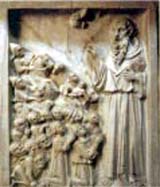
성 오도릭은 프리울리 뽀르데노네에서 태어나 15세 때에 우디네에서 프란치스칸이 되었다.
그러나 한적한 곳에서 하느님만 섬기려는 사명을 느끼고 원장의 허락을 받아 은수생활을 시작하였다.
그후 그는 다시 우디네로 돌아와서 주민들에게 설교했는데
수많은 군중들이 몰려다닐 정도로 그의 설교는 성공적이었다.
1321년경에 그는 서인도에 상륙했고,
1322년과 1328년에는 중국 북구 그리고, 1331년에는 우디네에서 선종하였다.
이 모든 것은 그가 하느님의 계시를 받고서 영혼을 구원하려는 열망 때문에 이곳 저곳을 다녔던 것이다.
(가톨릭 성인 사전에서)


오도리쿠스(Odoricus, 또는 오도리코)는 이탈리아의 프리울리(Friuli)에서 태어나 15세 때에 우디네(Udine)에서 작은 형제회의 회원이 되었다. 그러나 한적한 곳에서 하느님만을 섬기려는 사명을 느낀 그는 수도원장의 허락을 받고 은수생활을 시작하였다. 그 후 그는 다시 우디네로 돌아와서 주민들에게 설교했는데 수많은 군중들이 몰려다닐 정도로 그의 설교는 성공적이었다.
1321년경에 그는 서 인도에 상륙했고, 1322년과 1328년에는 중국 북부 지방에서 선교활동을 하였으며 1331년에 우디네에서 선종하였다. 이 모든 것은 그가 하느님의 계시를 받고서 영혼을 구원하려는 열망 때문에 이곳저곳을 다녔기 때문이다. 그에 대한 공경은 1775년에 승인되었다. 그는 오데리쿠스(Odericus)로도 불린다.
(가톨릭홈에서)





Beato Odorico da Pordenone Sacerdote
14 gennaio
Villanova di Pordenone, 1265 – Udine, 14 gennaio 1331
Divenuto sacerdote nell’Ordine Francescano, congiunse una esemplare austerità di vita con un instancabile zelo per la salvezza delle anime. Fu uno dei più illustri missionari dell’Ordine: si recò prima in Asia Minore e successivamente tra i Tartari; poi in Cina e in India, convertendo moltissimi alla fede di Cristo; meritò il nome di apostolo dei Cinesi. Tornato in Europa per riferire al Pontefice sulla situazione delle missioni nel lontano Oriente, morì a Udine nel 1331.
Etimologia: Odorico = assai ricco, dal tedesco
Martirologio Romano: A Udine, beato Odorico Mattiuzzi da Pordenone, sacerdote dell’Ordine dei Minori: percorse in lungo e in largo predicando il Vangelo le regioni dei Tartari, degli Indi e dei Cinesi da lui attraversate fino alla capitale della Cina Kambalik e molti convertì alla fede di Cristo.
Nel 1318 si imbarca a Venezia per Costantinopoli. Di qui attraversa il Mar Nero e prosegue lentamente per via di terra raggiungendo il Golfo Persico, dove torna a imbarcarsi verso l’India. Giunto a Tana, presso Bombay, ritrova e prende con sé i resti di quattro frati francescani, massacrati nel 1321. Risalito in nave, è il primo europeo a raggiungere l’Indonesia, e di qui infine arriva in Cina, sbarcando a Canton. Ma la sua meta finale è Khanbaliq, la capitale dell’immenso impero, dove arriva nel 1325, dopo sette anni di viaggio.
Il protagonista di questa avventura è un frate francescano: Odorico, nato a Villanova di Pordenone. Ha vestito l’abito di san Francesco in età giovanissima, e per qualche tempo ha condotto vita eremitica. A 25 anni Odorico viene ordinato sacerdote in Udine, ma non ha mai voluto “promozioni”. Si dedica volentieri all’attività missionaria in alcune regioni mediterranee, finché i superiori lo richiamano a Udine. Viene descritto come buon predicatore, ma poco sappiamo dei suoi anni giovanili. Per i Francescani dell’epoca, la Cina è qualcosa di remotissimo, come d’altronde lo è pertutti gli europei; ma è anche qualcosa di familiare, perché alla fine del Duecento il francescano Giovanni da Montecorvino vi ha fondato la prima comunità cristiana a Khanbaliq (che poi prenderà il nome di Pechino). E per la Cina ecco dunque partire anche frate Odorico. Un viaggio di anni, per mare e per terra, che si conclude a Khanbaliq, dove egli depone le reliquie dei martiri, appena arrivato. Per tre anni rimane poi in Cina, dedicandosi a una delle chiese fondate da Giovanni da Montecorvino .Riparte infine per l’Italia, passando per il Tibet. E ricompare a Venezia nel 1330. Ha percorso una distanza complessiva che supera la circonferenza dell’intera terra.
Ma da questo momento in poi le notizie su di lui si fanno scarse. Impiega un certo tempo a dettare la relazione del suo viaggio, che avrà una fama larghissima. Però si sa poco di quest’ultimo periodo della sua vita, che sembra trascorrere nell’ombra. L’unica sua iniziativa di grande importanza non gli riesce più. Voleva andare dal Papa, che era Giovanni XXII e si trovava ad Avignone: un viaggio ben da poco per uno come lui. Ma il suo fisico è ormai spossato. Non arriverà mai a vedere il Papa, non potrà mai esortarlo a mandare in Cina altri missionari.
Il suo viaggio si interrompe a Pisa: non ce la fa più. Cade ammalato e faticosamente torna ad avviarsi verso il Friuli. Fa una sosta ancora a Padova, ed eccolo infine ricoverato nel convento udinese di San Francesco. Qui frate Odorico si spegne, subito venerato come operatore di miracoli. Ma solo nel 1755 un Pontefice (Benedetto XIV) sanzionerà il culto per lui, col titolo di beato. I suoi resti sono stati collocati nella chiesa udinese della Madonna del Carmelo.
Autore: Domenico Agasso
Fonte:
_______________________
Aggiunto il 2004-01-07
January 14
Blessed Odoric Matiussi of Pordenone
1265-1331
Odoric was born of noble parents in the year 1265 at Pordenone in Friuli. He entered the Franciscan Order in the convent of Udine when he was only 15 years old. He felt himself called by God to be a missionary, and so prepared himself for his vocation by a strict life of penance, intimate union with God in solitude, and earnest application to study.
Ordained a priest, he laboured as a zealous and forceful preacher of penance. The people came from great distances to hear his sermons and through him to be reconciled to God in the tribunal of penance. But soon his vast field of labour no longer satisfied his burning zeal. He was desirous of winning souls for God in the distant heathen countries and, if God so wished it, even to shed his blood for Christ. In 1296 he went as a missionary to the Balkan Peninsula, and then to the Mongols in southern Russia.
In the year 1314 he sailed for the Orient. From Constantinople he crossed the Black Sea and landed at Trebizond, whence he travelled and preached in Armenia, Media, and Persia. In all these countries the Franciscans had founded mission centres.
With an Irish confrere, Friar James, he sailed to India and the islands of Ceylon, Sumatra and Java. He then pushed forward to China, and preaching Christ crucified as he went his way, he finally arrived at the capital, Cambalac, now called Peiping. There he met the great apostle of China, the Franciscan friar John of Montecorvino, who had been appointed archbishop of Cambalec in 1307.
After three years of fruitful labour in Cambalec, Odoric resolved to go to Europe and submit a report of his 15 years of apostolic labour to the then reigning pontiff John XXII, in the hope of securing fresh recruits for the apostolate. He traveled through China and central Asia, and returned to Italy in the year 1330, 65 years old, and emaciated by incessant toil and sufferings of various kinds, so that none of his brethren recognized him.
Reaching Pisa, he fell ill, and, as has been recorded, it was revealed to him that he should go to his native town and repair to the convent at Udine. At Padua he rested several days, and, at the command of his superiors, dictated an account of his apostolic journeys to Brother William. In this account the humble son of St. Francis says nothing of the hardships and dangers that he encountered; but his associates report that he suffered torment from evil spirits and wicked men, from wild animals, from hunger and thirst, and from heat and cold. Once he was seized by cruel heathens and tortured nigh unto death, when our Saviour and the Blessed Mother appeared, consoling and strengthening him.
Having arrived at Udine after a wearisome journey, Odoric patiently awaited death in the convent where he had once received the holy habit. After making a general confession and receiving the last sacraments he departed this laborious life and entered into eternal rest on January 14, 1331.
Moved by the many miracles that were wrought at the tomb of the great missionary, Pope Benedict XIV, in the year 1775, approved the veneration which had been paid to Blessed Odoric. In the year 1881 the city of Pordenone erected a magnificent memorial to its distinguished son.
CONCERNING THE MISSIONS AMONG THE INFIDELS
Consider how pleasing to God must have been the labour and exertion of Blessed Odoric, as he brought the light of the Faith to so many nations, and led them to the bosom of the Church which alone could bring them salvation. “Without faith it is impossible to please God” (Heb 11:6) and to be saved. If your heavenly Father had so great a desire for the salvation of souls that He sent His only-begotten Son into the world to enlighten them who sat in darkness and in the shadow of death, how pleasing to Him must be the labours of apostolic men who continue the work of our Divine Saviour! They are doing what Christ Himself commissioned the apostles to do in His parting words to them: “Go and teach all nations, baptizing them in the name of the Father, and of the Son, and of the Holy Spirit” (Matt 28:19). O happy calling, to co-operate in God’s work of leading souls to heaven! -- Would you not like to co-operate in such work?
Consider how this co-operation can be put into effect. The Catholic Church has not only sent out missionaries at all times, but she has established an official department for the propagation of the Faith, which supervises all such activity. For its purposes vast financial assistance is needed, in order to support the missions in the distant heathen countries, and all those whom God has blessed with temporal goods can lend their co-operation. The department of Propaganda accepts, through the bishops and the priests, the gifts and bequests of the faithful toward spreading the Faith, in order to apply them where they are most needed. By affiliation with the Society of the Propagation of the Faith, the Holy Childhood Association, the Franciscan Missionary Union, and similar institutions, one can co-operate in the holy work of the missions by easy regular donations. -- Have you utilized such opportunities according to your means?
But more necessary than the financial aid, is the special grace of God for the propagation of the Faith, and everybody can help to obtain that grace from God by his prayers and by offering up his hardships. St. Theresa, who entertained an ardent desire for the conversion of the poor heathens, offered up all her prayers and mortifications for the purpose, and she received from God the assurance that she co-operated in the salvation of more infidels than St. Francis Xavier had baptized. So you, too, can co-operate daily in the spreading of the Faith, by your daily prayers and by offering up the difficulties you must suffer daily in your state of life, as is required of the members of the Apostleship of Prayer. Should not every Catholic Christian this profess his gratitude for the grace of having been born of Catholic parents?
PRAYER OF THE CHURCH
O God, who, in order to lead the nations of the East to the bosom of the Church, didst equip Blessed Odoric with invincible strength of soul, graciously look upon all those who are still blinded by the deceptions of hell, that by his glorious merits they may be delivered from their darkness. Through Christ our Lord. Amen.


